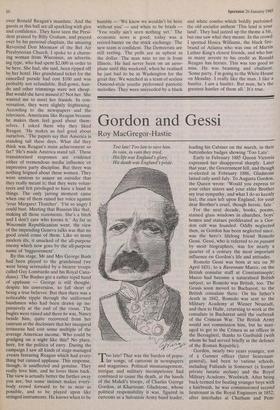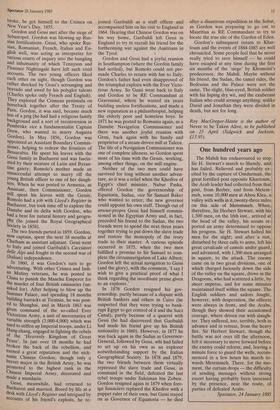Gordon and Gessi
Roy MacGregor-Hastie
Too late! Too late to save him. In vain, in vain they tried. His life was England's glory. His death was England's pride.
Moo late! That was the burden of popu- lar songs, of cartoons in newspapers and magazines. Political mismanagement, intrigue and military incompetence had combined to cause the death, at the hands of the Mandi's troops, of Charles George Gordon, at Khartoum. Gladstone, whose political responsibility it was, figured in cartoons as a Salvation Army band leader, leading his Cabinet on the march, in their buttonholes badges showing 'Too Late'.
Early in February 1885 Queen Victoria expressed her disapproval sharply. Later that year, the Government fell, and though re-elected in February 1886, Gladstone lasted only until July. To Augusta Gordon, the Queen wrote: 'Would you express to your other sisters and your elder Brother my true sympathy, and what I do so keenly feel, the stain left upon England, for your dear Brother's cruel, though heroic, fate.'
For the next decade, books, poems, stained glass windows in .churches, boys' homes and statues proliferated as a Gor- don cult was founded. Oddly neglected then, as Gordon has been neglected since, was the hero's lifelong friend Romolo Gessi. Gessi, who is referred to en passant by most biographers, was for nearly a quarter of a century the most important influence on Gordon's life and attitudes.
Romolo Gessi was born at sea on 30 April 1831, to a Ravennate Marco, on the British consular staff at Constantinople; Marco had become a naturalised British subject, so Romolo was British, too. The Gessis soon moved to Bucharest, to the British consulate there. On his father's death in 1842, Romolo was sent to the Military Academy at Wiener Neustadt, and then to Halle, returning to work at the consulate in Bucharest until the outbreak of the Crimean War. The British Army would not commission him, but he man- aged to get to the Crimea as an officer in the Bersaglieri, thanks to Garibaldi (with whom he had served briefly in the defence of the Roman Republic).
Gordon, nearly two years younger, son of a Gunner officer (later lieutenant- general), had been to various schools, including Fullands in Somerset (a former private lunatic asylum) and the Royal Military Academy, Woolwich. After being back-termed for beating younger boys with a hairbrush, he was commissioned second lieutenant in the Royal Engineers in 1852; after interludes at Chatham and Pem- broke, he got himself to the Crimea on New Year's Day, 1855. Gordon and Gessi met after the siege of Sebastopol. Gordon was blowing up Rus- sian fortifications. Gessi, who spoke Rus- sian, Romanian, French, Italian and En- glish well, was acting as interpreter for various courts of inquiry into the bungling and inhumanity of which Tennyson and Florence Nightingale have left such vivid accounts. The two young officers liked each other on sight, though Gordon was rather shocked by Gessi's scrounging and bravado and awed by his polyglot talents (Charles spoke only French and English). They explored the Crimean peninsula on horseback together after the Treaty of Paris. Gordon, it was said, became much less of a prig (he had had a religious family background and a sort of reconversion in
Pembroke vice a fundamentalist Captain
Drew, who wanted to marry Augusta Gordon). In May 1856, Gordon was appointed an Assistant Boundary Commis- sioner, helping to redraw the frontiers of Bessarabia. He spent his leaves with the Gessi family in Bucharest and was fascin- ated by their mixture of Latin and Byzan- tine gaiety; Romolo's mother made an unsuccessful attempt to marry off the young British officer to one of her daugh- ters. When he was posted to Armenia, as Assistant, then Commissioner, Gordon
still spent his leaves with the Gessis; Romolo had a job with Lloyd's Register in
Bucharest, but took time off to explore the Danube and its delta with Gordon, who had a bent for natural history and geogra- phy (he joined the Royal Geographical Society in 1858). The two friends parted in 1859. Gordon, now captain, spent the next 18 months at
Chatham as assistant adjutant. Gessi went to Italy and joined Garibaldi's Cacciatori delle Alpi and fought in the second war of (Italian) independence.
In 1860, it was Gordon's turn to go adventuring. With other Crimea and Indi- an Mutiny veterans, he was posted to China to punish the Manchu Emperor for the murder of four British emissaries (un- asked for). After helping to blow up the Summer Palace, and spending 18 months building barracks at Tientsin, he was post- ed to Shanghai, and in March 1863 was given command of the so-called Ever Victorious Army, a unit of mercenaries of variable strength (3,000-4,000) which was used to stiffen up Imperial troops, under Li Hung-chang, engaged in fighting the rebels of the 'Heavenly Kingdom of Great Peace'. In just over 18 months he had broken the back of the rebellion, and earned a great reputation and the nick- name Chinese Gordon; though only a brevet major in the British Army, he was Promoted to the highest rank in the Chinese Imperial Army, decorated and made a mandarin.
Gessi, meanwhile, had returned to Bucharest and married. Bored by life at a
desk with Lloyd's Register and intrigued by accounts of his friend's exploits, he re-
joined Garibaldi as a staff officer and accompanied him on his visit to England in 1864. Hearing that Chinese Gordon was on his way home, Garibaldi left Gessi in England to try to recruit his friend for the forthcoming war against the Austrians in the Tyrol.
Gordon and Gessi had a joyful reunion in Southampton (where the Gordon family had settled), but Romolo could not per- suade Charles to return with hm to Italy; Gordon's father had even disapproved of the triumphal exploits with the Ever Victo- rious Army. So Gessi went back to Italy and Gordon to be RE Commandant at Gravesend, where he wasted six years building useless fortifications, and made a new reputation as a philanthropist, helping the elderly poor and homeless boys. In 1871 he was posted to Romania again, as a Danube Navigation Commissioner and there was another joyful reunion with Gessi, back again with his family and proprietor of a steam-driven mill at Tulcea. The life of a Navigation Commissioner was one of complete idleness, so Gordon spent most of his time with the Gessis, working, among other things, on the mill engine.
Neither of the two men could have survived for long without another adven- ture, so it was a relief when the Khedive of Egypt's chief minister, Nubar Pasha, offered Gordon the governorship of Equatoria, Sudan, vice Sir Samuel Baker who wanted to retire; the new governor could appoint his own staff. Though out of amour-propre Gessi had himself commis- sioned in the Egyptian Army and, in fact, preceded his friend to the Sudan, the two friends were to spend the next three years together trying to put down the slave trade and restore the monopoly of the ivory trade to their master. A curious episode occurred in 1875, when the two men fulfilled a promise to Sir Samuel to com- plete the circumnavigation of Lake Albert; Gordon left the actual navigation to Gessi (and the glory), with the comment, '1 say I wish to give a practical proof of what I think regarding the inordinate praise given to an explorer.'
In 1876 Gordon resigned his gov- ernorship, partly because of a dispute with British bankers and others in Cairo (he suspected that they were trying to bank- rupt Egypt to get control of it and the Suez Canal), partly because of a quarrel with Gessi (he had discovered that Garibaldi had made his friend give up his British nationality in 1860). However, in 1877 he was back again in the Sudan as Governor- General, followed by Gessi, whi had failed to set up on his own as an explorer notwithstanding support by the Italian Geographical Society. In 1878 and 1879, the two friends between them virtually repressed the slave trade and Gessi, in command in the field, defeated the last rebel troops under Suleiman bin Zobeir.
Gordon resigned again in 1879 when fore- ign financiers replaced the Khedive with a puppet ruler of their own, but Gessi stayed on as Governor of Equatoria — he died after a disastrous expedition in the Sobat, as Gordon was preparing to go out to Mauritius as RE Commandant to try to locate the true site of the Garden of Eden.
Gordon's subsequent return to Khar- toum and the events of 1884-1885 are well chronicled. Some people feel that he never really tried to save himself — he could have escaped at any time during the first six months of the 'siege' by Khomeini's predecessor, the Mandi. Maybe without his friend, the Sudan, the camel rides, the Bedouins and the Palace were not the same. The slight, blue-eyed, British soldier with his lisping dry wit, and the exuberant Italian who could arrange anything: unlike David and Jonathan they were divided in death, but not for long.
Roy MacGregor-Hastie is the author of Never to be Taken Alive, to be published on 23 April (Sidgwick and Jackson, £13.95).











































 Previous page
Previous page